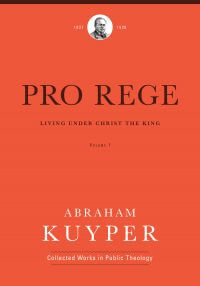All Christians agree that Christ is God—the doctrine of the Trinity is at the core of what we believe, and the church affirmed Jesus’ divinity in its early councils. Though we know the Bible affirms this, it even more clearly presents Jesus as our King. A quick Logos search shows that even Christ’s enemies called him a king (Matt 27:11; John 18:37; 19:19; Acts 17:7). Over a hundred verses in the New Testament affirm Jesus as Lord. Elsewhere he is even called the King of other kings (for example, 1 Tim 6:15; Rev 17:14). And in Matthew 28:18, Jesus himself says that he has all authority in heaven and earth.

Abraham Kuyper was distressed by the culture of his time—both the depravity among non-Christians and the ignorance of Christ’s kingship among believers. He writes, “The European population that calls itself Christian . . . profits legally and socially from Christianity, but fails in confession and walk to show even the slightest bit of reverence for Christ.” And why, he asks, do unbelievers respect the King of kings even more than we do? He speaks with incisive words that are even more meaningful today, a century after he wrote them:
For the intelligentsia of Christian countries, Christ’s status is even lower than for the Muslim—it amazes and confounds the Muslim, leaves a lasting impression on him of the inferiority of our holy religion, and makes our mission work among Muslims all but impossible.
What do we gain by affirming Christ as King? In Pro Rege, Kuyper shows that Christians can only engage culture fully when they realize that Jesus is the ruler of the world. Because Jesus has authority over the entire creation, he exercises his rule even over unbelievers. He also extends his grace even to them—though this “common grace” does not save non-Christians, it limits their sinfulness and also causes them to do good in the world.
Here, Kuyper applies the theology of common grace in practical ways: Christians can be a part of the world of art, because Jesus rules over it; they can be credible scholars, because Jesus created the world we study; they can be fearless, realizing that their faith cannot die out because Jesus is their Lord and Master. All of this is possible because Christ rules over art and science—and even in places where Christians are most attacked.
Christians must not give up on the world, Kuyper argues. They must engage it. Believers in Christ must not retreat from the world into a Christian subculture, but must engage the world over which Jesus rules as King of all.
***
Volume one of Pro Rege is now available in English for the first time ever. It carefully defends the reality of Christ’s kingship, while the forthcoming second and third volumes show how Jesus’ authority affects every area of our lives. This book is available individually in print or digital format, or you can get it as part of the Abraham Kuyper Collected Works in Public Theology 12-volume collection.





